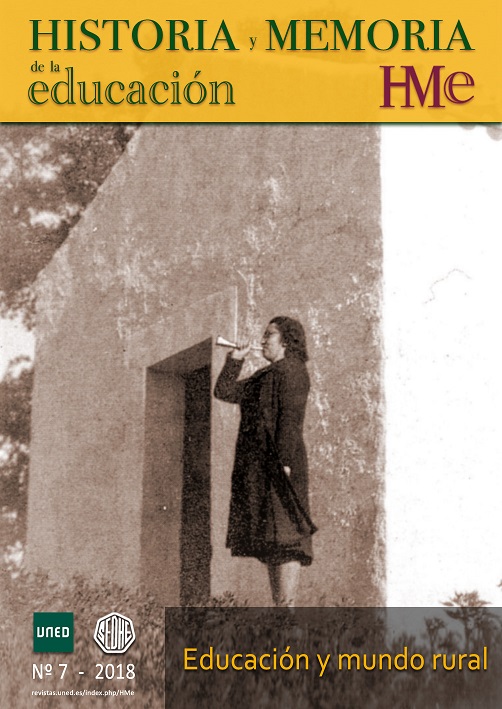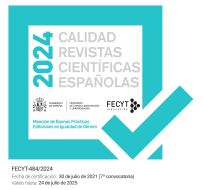Elena Fortún and the Residencia de Señoritas Librarianship Group (1930-1936)
DOI:
https://doi.org/10.5944/hme.7.2018.18518Keywords:
Librarianship Studies, Residencia de Señoritas, Elena Fortún, María de Maeztu, Women´s educationAbstract
The librarianship studies, developed under the auspices of the Boston International Institute by the «Residencia de Señoritas» between 1930 and 1936, were part of the first educational initiatives taken to promote the integration of women into the labour force of Spain. These studies were led
by Maria de Maeztu. Along with significant figures like Elena Fortún, a huge collective of anonymous students participated and deposited in this enterprise their important personal prospects. In this work we have investigated the information included in their registration forms as well as Elena Fortún’s testimony regarding this activity. We have attempted to recover the human spirit or, in other words, the inside history of this pioneering effort, truncated by the Spanish Civil War and its final outcome.
Downloads
References
Baroja, Carmen. Recuerdos de una mujer de la generación del 98. Barcelona: Tus¬quets, 1998.
Cacho Viu, Vicente. La institución Libre de Enseñanza, I (orígenes y etapa univer¬sitaria). Madrid: Rialp, 1962.
Codina Canet, María Adelina. «Fuentes Documentales y Archivos de la Residen¬cia de Señoritas de Madrid (1915-1936)». Revista General de Información y Documentación 25 (2), (2015): 493-515.
DíazFernández, Paloma. «La dictadura de Primo de Rivera. Una oportunidad para la mujer». Espacio, Tiempo y Forma, Serie V, Historia Contemporánea, 17 (2005): 175-190.
Dorao, Marisol. Los mil sueños de Elena Fortún. Cádiz: Universidad de Cádiz, 1999.
Faus Sevilla, Pilar. La lectura pública en España. Madrid: Anabad, 1990.
Fortún, Elena y Matilde Ras. El camino es nuestro. Madrid: Fundación Banco de Santander, 2014.
Fraga Fernández, María Jesús. Elena Fortún, periodista. Madrid: Pliegos, 2013.
Hurtado, Amparo. «El Lyceum Club Femenino (Madrid 1926-1939)». Boletín Institución Libre de Enseñanza 36 (1999): 23-35.
Jiménez Landi, Antonio. La Institución Libre de Enseñanza y su ambiente. Madrid: Editorial Complutense, 1996.
Laforet, Carmen y Elena Fortún. De corazón y Alma (1947-1952). Madrid: Fun¬dación Banco de Santander, 2017.
Mangini, Shirley. Las modernas de Madrid. Barcelona: Península, 2000.
Marín Eced, Teresa. La renovación pedagógica en España (1907-1936). Los pen¬sionados en pedagogía por la Junta de Ampliación de Estudios. Madrid: Con¬sejo Superior de Investigaciones Científicas, 1989.
Marín Eced, Teresa Innovadores de la educación en España (Becarios de la JAE). Castilla-La Man¬cha: Universidad de Castilla-La Mancha, 1991.
Melián, Elvira M. «Rastros de nube, María Martos de Baeza y su mundo» Arenal 8 (2), (2001): 379-388.
Melián, Elvira M. «Memorias de la Penumbra: Carmen Baroja, Zenobia Camprubí y Elena Fortún, mujeres en la penumbra del 98». Boletín Institución Libre de Ense¬ñanza, 5 (2005): 19-39.
Melián, Elvira M. «María de Maeztu Withney y Sofía Novoa Ortiz (1919-1936), cultivar la sa¬lud, cultivar el espíritu, cultivar la lealtad». Circunstancia: Revista de Cien¬cias Sociales del Instituto Universitario de Investigación Ortega y Gasset 14 (2007). www.fog.es/circunstancia/numero14/art7.
Melián, Elvira M. «En la frontera: señas de identidad de la labor pedagógica hispano-america¬nista en María de Maeztu (1924-1936)». Historia de la Educación 34 (2015): 287-303.
Pérez-Villanueva Tovar, Isabel. María de Maeztu: una mujer en el reformismo educativo español. Madrid: UNED, 1989.
Pérez-Villanueva Tovar, Isabel. La Residencia de Estudiantes 1910-1936. Grupo Universitario y Residencia de Señoritas. Madrid: CSIC, 2011.
Ras, Matilde. Diario. Madrid: Instituto Editorial Reus, 1949.
Ribagorda, Álvaro. «Una historia en la penumbra: las intelectuales de la Resi¬dencia de Señoritas» Sistema 188 (2005): 54-61.
Rodríguez Tojas, Alba. «Mujeres y trabajo: la feminización de la profesión bi¬bliotecaria». PhD diss., Universidad Complutense de Madrid, 2013. https://www.ucm.es/data/cont/docs/329-2013-12-17-.
Rubio López, Pilar. Vida de María Moliner. Madrid: Eila, 2010.
Vázquez Ramil, Raquel. Mujeres y educación en la España Contemporánea. La Institución Libre de Enseñanza y la Residencia de Señoritas de Madrid. Ma¬drid: Akal, 2012.
Vázquez Ramil, Raquel. «La Residencia de Señoritas de Madrid durante la II República: entre la alta cultura y el brillo social». Espacio, Tiempo y Educación 2 (1), (2015): 323-346.
VV. AA. Las Misiones Pedagógicas 1931-1936. Madrid: Residencia de Estudian¬tes, 2007.
Zulueta, Carmen de. Misioneras, feministas, educadoras. Madrid: Castalia, 1984.
Zulueta, Carmen de. Cien años de educación de la mujer española. Historia del Instituto Internacio¬nal. Madrid: Castalia, 1992.
Zulueta, Carmen de y Alicia Moreno. Ni convento ni college. La Residencia de Señoritas. Madrid: Consejo Superior de Investigaciones Científicas, 1993
Downloads
Published
How to Cite
Issue
Section
License
Authors who publish in Historia y Memoria de la Educación agree to the following terms:
- Authors retain copyright and grant the journal right of first publication with the work simultaneously licensed under a Creative Commons Attribution-NonCommercial 4.0 International that allows others to share the work with an acknowledgement of the work's authorship and initial publication in this journal.
- Authors are able to enter into separate, additional contractual arrangements for the non-exclusive distribution of the journal's published version of the work (e.g., post it to an institutional repository or publish it in a book), with an acknowledgement of its initial publication in this journal.
- Authors are permitted and encouraged to post their work online (e.g., in institutional repositories or on their website) prior to and during the submission process, as it can lead to productive exchanges, as well as earlier and greater citation of published work (See The Effect of Open Access).










